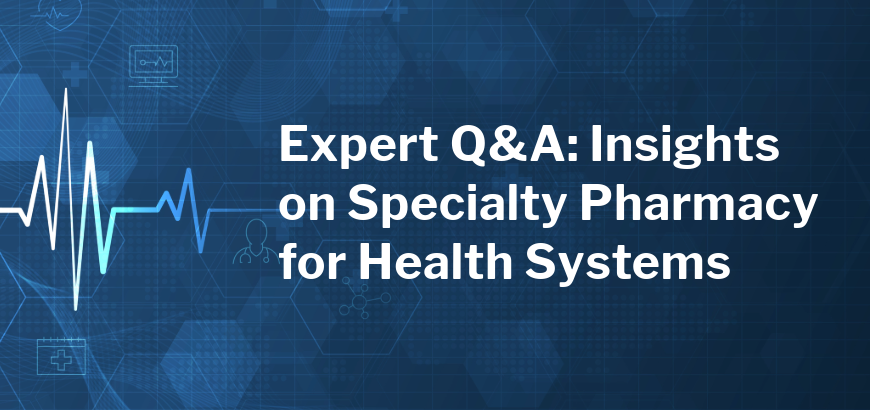Read time: 3 minutes
By: Ginger Thorpe
 Keeping patients within the health system unequivocally leads to better outcomes across the board, yet more and more specialty prescriptions are being filled outside the hospital. Not only is there a clinical impact to the patient here – but a financial one for the health system as well. With a deliberate and strategic approach to specialty pharmacy, however, health systems can increase recapture rates for the benefit of both patient and profitability, ultimately allowing them to provider better care to the populations they serve. Still, there are a number of challenges in building or optimizing a health system specialty pharmacy program. In this expert Q&A, Ginger Thorpe, Vice President and General Manager of Pharmacy Solutions in Health Systems, shares insights on these challenges as well as thoughts on areas health systems should focus on within their specialty pharmacy strategy, including data analysis, payer and limited distribution drug (LDD) access, and more.
Keeping patients within the health system unequivocally leads to better outcomes across the board, yet more and more specialty prescriptions are being filled outside the hospital. Not only is there a clinical impact to the patient here – but a financial one for the health system as well. With a deliberate and strategic approach to specialty pharmacy, however, health systems can increase recapture rates for the benefit of both patient and profitability, ultimately allowing them to provider better care to the populations they serve. Still, there are a number of challenges in building or optimizing a health system specialty pharmacy program. In this expert Q&A, Ginger Thorpe, Vice President and General Manager of Pharmacy Solutions in Health Systems, shares insights on these challenges as well as thoughts on areas health systems should focus on within their specialty pharmacy strategy, including data analysis, payer and limited distribution drug (LDD) access, and more.
McKesson Health Systems Editorial Team (MHS): What are some of the primary challenges affecting health systems specifically when it comes to specialty pharmacy?
Ginger Thorpe (GT): One major challenge is understanding the true extent of their opportunities, especially for those with revenues between $20 million and $100 million. Figuring that out is not always an easy lift, and these systems often struggle with the labor intensity and the abundance of vendors offering solutions, many of which overlap and/or are unclear – so it can be difficult to really know where to start and what’s actually going to be of value for them.
Another challenge is that health systems frequently lack the data and tools to effectively track and manage patient prescriptions – meaning where those scripts are going when they leave the hospital – including answering questions like “Did the script get filled at all?”; “Where did it get filled?”; “Who was the payer?” – all of which are essential things to know for recapturing scripts in the future.
Additionally, wading through the complexities of limited distribution drugs (LDDs) and securing payer access can, at times, significantly impact patient care and profitability alike.
MHS: How can health systems leverage data to enhance specialty pharmacy operations?
GT: By analyzing their current data, health systems can identify where patients are filling prescriptions outside the system and which drugs are being used. This information helps in making informed decisions about which drugs to prioritize for access and how to better optimize their specialty pharmacy programs. Data insights can also help in identifying patient populations and therapeutic areas where the health system can make the most impact, leading to better patient outcomes and increased revenue retention.
MHS: What is McKesson's role in supporting health systems in specialty pharmacy?
GT: Through Specialty Pharmacy Enablement – just one piece of Specialty and Infusion for Health Systems by McKesson – we are able to provide those comprehensive data insights, help facilitate accreditation, and offer expert advisory services. We also help health systems build and improve their specialty pharmacy programs by providing detailed information on payers and more, which is essential for negotiating better contracts. We can analyze a health system's data to identify where scripts are being filled outside the system and provide actionable insights. A few other important highlights here are our relationships with manufacturers and our ability to provide a holistic view of a health system's opportunities – something, as we discussed, is not always apparent from an internal perspective.
MHS: What advice would you give a health system as far as where to start in building or optimizing their specialty pharmacy program?
GT: Whether you’re just getting started with establishing a specialty pharmacy program or you’ve already got a well-oiled machine – or you’re somewhere in the middle – I would advise conducting a thorough data analysis to understand your current patient populations and therapeutic opportunities. Once this data is analyzed, focus on securing access to limited distribution drugs (LDDs) and improving payer access as two of your top priorities. Again, partnering with a trusted provider like McKesson can provide the necessary data insights, advisory services, and support to navigate these challenges effectively. Additionally, investing in patient education and liaison services can help guide patients to use in-house specialty pharmacies, enhancing patient retention and financial performance overall.
Read Ginger’s full bio here.
To learn more about how partnering with Specialty and Infusion for Health Systems by McKesson can help your health system recapture specialty volume, drive better clinical outcomes, and achieve more for the business of pharmacy, contact us today.

Share
Post
Post
Email